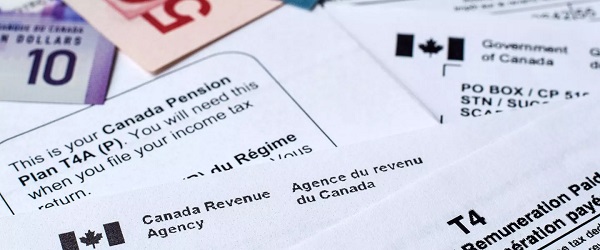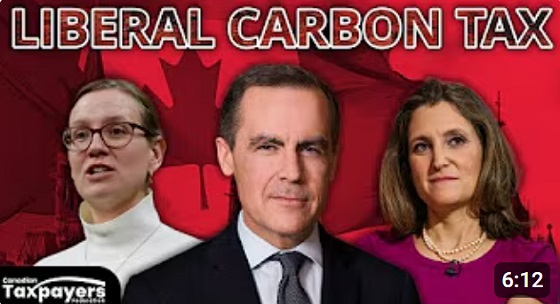Business
Federal tax policy in 2025 will not be kind to Canadians

From the Fraser Institute
By Matthew Lau
Federal tax policy was not kind to Canadians in 2024, and that shouldn’t be a surprise. It wasn’t kind to Canadians in 2023, 2022 or any year since 2016 when the Trudeau government established a new income tax bracket of 33 per cent, pushing the combined federal and provincial top tax rate over 50 per cent in many provinces.
To recap 2024 tax policy changes, the federal government began the year with its sixth consecutive Canada Pension Plan tax hike. In 2018, before the government’s CPP “enhancements” (to use the government’s phrase), for a worker earning $85,000, the combined employer and employee CPP tax was $5,188. In 2024 the same worker’s tax bill was $8,111—or about 56 per cent higher including the government’s new “CPP2” tax.
Unfortunately, things will only get worse for Canadians in 2025. The CPP tax bill for the Canadian earning $85,000 will rise to $8,860 in 2025, bringing the total nominal tax increase to 71 per cent through the government’s seven annual CPP “enhancements.”
In addition to making the CPP tax more expensive yearly, the federal government also has been increasing the carbon tax each year. In April 2024, the Trudeau government increased the carbon tax to $80 per tonne from $65 per tonne, and like the CPP tax, the carbon tax will become more expensive yet again in 2025, rising another $15 per tonne to $95.
Another big tax change in 2024 was the capital gains tax hike announced in June. The Trudeau government claimed it was increasing taxes only on “0.13 per cent of Canadians in any given year”—a statistic that’s both misleading and incomplete. First, 0.13 per cent of Canadians “in any given year” are a different group than the 0.13 per cent of Canadians in the previous or following years, so many more than 0.13 per cent of Canadians will directly pay the tax.
Second, the tax hike also affects corporations, of which millions of Canadians are owners or part-owners (even excluding their ownership of publicly traded companies’ shares). Overall, economist Jack Mintz estimated that through their ownership of private corporations (based on 2021 data) about 4.74 million Canadians would be affected by the higher tax rate, or 15.8 per cent of tax filers. In other words, about 100 times more Canadians than the Trudeau government suggested.
And in reality, just about all Canadians will be made worse off by the tax hike because almost everyone will effectively be subject to the higher capital gains tax rate through their exposure to publicly traded corporations including through public pension plans.
Worse, because capital gains taxes are taxes on investment, the certain effect of the tax hike will be to reduce business investment. Unfortunately as multiple economic analyses have shown, business investment in Canada has already been extremely weak in the past decade, falling further behind the United States and other developed economies, and contributing to Canada’s productivity and economic stagnation crisis. The capital gains tax hike will make this even worse.
Finally, the Trudeau government ended 2024 with a so-called sales tax “holiday” for two months, which imposes severe administrative and logistical nightmares onto business owners (in a survey of small businesses, most opposed the change and 75 per cent said it would be costly and complicated to implement), and will do nothing to increase productivity or improve economic incentives.
Quite the opposite; government deficits fund the tax “holiday,” which will increase the future tax burden—something that will further reduce economic productivity in the future. Federal tax policy clearly was not kind to Canadians in 2024. Unfortunately, 2025 is looking no better.
2025 Federal Election
MEI-Ipsos poll: 56 per cent of Canadians support increasing access to non-governmental healthcare providers

-
Most believe private providers can deliver services faster than government-run hospitals
-
77 per cent of Canadians say their provincial healthcare system is too bureaucratic
Canadians are increasingly in favour of breaking the government monopoly over health care by opening the door to independent providers and cross-border treatments, an MEI-Ipsos poll has revealed.
“Canadians from coast to coast are signalling they want to see more involvement from independent health providers in our health system,” explains Emmanuelle B. Faubert, economist at the MEI. “They understand that universal access doesn’t mean government-run, and that consistent failures to deliver timely care in government hospitals are a feature of the current system.”
Support for independent health care is on the rise, with 56 per cent of respondents in favour of allowing patients to access services provided by independent health entrepreneurs. Only 25 per cent oppose this.
In Quebec, support is especially strong, with 68 per cent endorsing this change.
Favourable views of accessing care through a mixed system are widespread, with three quarters of respondents stating that private entrepreneurs can deliver healthcare services faster than hospitals managed by the government. This is up four percentage points from last year.
Countries like Sweden and France combine universal coverage with independent providers and deliver faster, more accessible care. When informed about how these health systems run, nearly two in three Canadians favour adopting such models.
The poll also finds that 73 per cent of Canadians support allowing patients to receive treatment abroad with provincial coverage, which could help reduce long wait times at home.
Common in the European Union, this “cross-border directive” enabled 450,000 patients to access elective surgeries in 2022, with costs reimbursed as if they had been treated in their home country.
There’s a growing consensus that provincial healthcare systems are overly bureaucratic, with the strongest agreement in Alberta, B.C., and Quebec. The proportion of Canadians holding this view has risen by 16 percentage points since 2020.
Nor do Canadians see more spending as being a solution: over half say the current pace of healthcare spending in their province is unsustainable.
“Governments shouldn’t keep doubling down on what isn’t working. Instead, they should look at what works abroad,” says Ms. Faubert. “Canadians have made it clear they want to shift gears; now it’s up to policymakers to show they’re listening.”
A sample of 1,164 Canadians aged 18 and older was polled between March 24th and March 28th, 2025. The margin of error is ±3.3 percentage points, 19 times out of 20.
The results of the MEI-Ipsos poll are available here.
* * *
The MEI is an independent public policy think tank with offices in Montreal, Ottawa, and Calgary. Through its publications, media appearances, and advisory services to policymakers, the MEI stimulates public policy debate and reforms based on sound economics and entrepreneurship.
2025 Federal Election
POLL: Canadians say industrial carbon tax makes life more expensive

The Canadian Taxpayers Federation released Leger polling showing 70 per cent of Canadians believe businesses pass on most or some of the cost of the industrial carbon tax to consumers. Meanwhile, just nine per cent believe businesses pay most of the cost.
“The poll shows Canadians understand that a carbon tax on business is a carbon tax on Canadians that makes life more expensive,” said Franco Terrazzano, CTF Federal Director. “Only nine per cent of Canadians believe Liberal Leader Mark Carney’s claim that businesses will pay most of the cost of his carbon tax.
“Canadians have a simple question for Carney: How much will your carbon tax cost?”
The federal government currently imposes an industrial carbon tax on oil and gas, steel and fertilizer businesses, among others.
Carney said he would “improve and tighten” the industrial carbon tax and extend the “framework to 2035.” Carney also said that by “changing the carbon tax … We are making the large companies pay for everybody.”
The Leger poll asked Canadians who they think ultimately pays the industrial carbon tax. Results of the poll show:
- 44 per cent say most of the cost is passed on to consumers
- 26 per cent say some of the cost is passed on to consumers
- 9 per cent say businesses pay most of the cost
- 21 per cent don’t know
Among those decided on the issue, 89 per cent of Canadians say businesses pass on most or some of the cost to consumers.
“Carbon taxes on refineries make gas more expensive, carbon taxes on utilities make home heating more expensive and carbon taxes on fertilizer plants increase costs for farmers and that makes groceries more expensive,” Terrazzano said. “A carbon tax on business will push our entrepreneurs to cut production in Canada and increase production south of the border and that means higher prices and fewer jobs for Canadians.”
-

 Alberta2 days ago
Alberta2 days agoMade in Alberta! Province makes it easier to support local products with Buy Local program
-

 2025 Federal Election2 days ago
2025 Federal Election2 days agoASK YOURSELF! – Can Canada Endure, or Afford the Economic Stagnation of Carney’s Costly Climate Vision?
-

 2025 Federal Election2 days ago
2025 Federal Election2 days agoCSIS Warned Beijing Would Brand Conservatives as Trumpian. Now Carney’s Campaign Is Doing It.
-

 2025 Federal Election2 days ago
2025 Federal Election2 days agoInside Buttongate: How the Liberal Swamp Tried to Smear the Conservative Movement — and Got Exposed
-

 Bruce Dowbiggin1 day ago
Bruce Dowbiggin1 day agoIs HNIC Ready For The Winnipeg Jets To Be Canada’s Heroes?
-

 Dr. Robert Malone1 day ago
Dr. Robert Malone1 day agoThe West Texas Measles Outbreak as a Societal and Political Mirror
-

 COVID-191 day ago
COVID-191 day agoCOVID virus, vaccines are driving explosion in cancer, billionaire scientist tells Tucker Carlson
-

 Health1 day ago
Health1 day agoHorrific and Deadly Effects of Antidepressants









